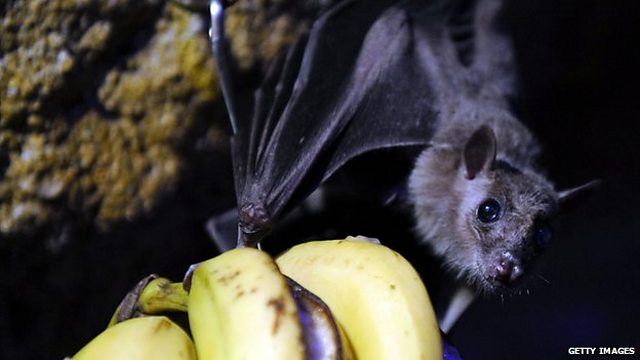
Bushmeat, Ebola Outbreak, Sniffer Flies
Researchers have surveyed nearly 600 people in Ghana – currently unaffected by Ebola - about the perceived risks of hunting and eating bushmeat.
Bushmeat
Bats are seen as a local delicacy in many countries in Africa and are thought to be carriers of the Ebola virus, as well as carrying other diseases. Now researchers have surveyed nearly 600 people in Ghana – currently unaffected by Ebola - about the perceived risks of hunting and eating bushmeat. They also carried out in-depth interviews to understand the knowledge of the health risks associated with bushmeat. Claudia speaks with Oliver Restif from the University of Cambridge about the attitudes towards eating bushmeat.
Ebola Outbreak
As the World Health Organisation announces that the situation in Guinea, Liberia and Sierra Leone is deteriorating, with widespread and persistent transmission of Ebola Virus Disease, the UK has introduced screening measures at Heathrow airport for passengers arriving from Ebola-affected countries. How has this particular outbreak become so widespread, and where did it start? Lucie Green discusses the source, spread and science of Ebola with Jonathan Ball, Professor of Molecular Virology at the University of Nottingham.
Sniffer Flies
New research has revealed the fruit fly’s surprising ability to sniff out a range of hazardous chemicals – an ability that could soon see their ‘noses’ being used to detect drugs and explosives. An international team of scientists discovered that the fruit fly’s smell neurons were not only able to detect and respond to smells that were familiar to them, like rotting fruit, but also a whole range of smells associated with explosives, illicit drugs and combustion products. Lead author of the research, Professor Thomas Nowotny from the University of Sussex, explains how the fly’s smell neurons could make future electronic detection devices much faster and more sensitive.
Chagas Disease
The parasite which causes chagas disease damages the heart, digestive and nervous system and if left untreated it can kill. The insect which spreads the parasite thrives in countries like Bolivia. But this silent killer once confined to Latin America has now become global. In Spain, up to 80,000 migrants from Latin America are now living with the illness. No one can predict who will develop serious health complications, and the main reason for that is the lack of information, as Gabriela Torres reports from the capital, Madrid.
Urine Trouble: What’s in our Water
You have a headache and take a pill. The headache is gone, but what about the pill? What we flush away makes its way through sewers, treatment works, rivers and streams and finally back to your tap. Along the way most of the drugs we take are removed but the tiny amounts that remain are having effects. Feminised fish in our rivers, starlings feeding on Prozac-rich worms, and bacteria developing antibiotic resistance - scientists are just beginning to understand how the drugs we take are leaving their mark on the environment.
Smart Street-lighting
Copenhagen becomes the latest city to experiment with smart street lighting, aimed at reducing emissions. Los Angeles led the way last year in a project that involved swapping its entire system for LED lamps – along with a pilot remote control system. Barcelona, too, is experimenting with lights that can detect motion and weather conditions. Malcolm Brabant reports on how Copenhagen wants to encourage more cities to make the change by demonstrating what different types of lamps can do.
Last on
More episodes
Chapters
-
Bushmeat
Bats are thought to be carriers of the Ebola virus
Duration: 06:02
Ebola Outbreak
How has this particular outbreak become so widespread, and where did it start? Lucie
Duration: 07:09
Sniffer flies
Duration: 09:10
Carnivores
Carnivores and their effect on the environment.
Duration: 03:50
Chagas Disease
Chagas disease damages the heart, digestive and nervous system and can kill.
Duration: 09:10
What's in our water?
Scientists are just beginning to understand how the drugs we take affect the environment.
Duration: 08:52
Smart street-lighting
Copenhagen is the latest city to experiment with smart street lighting.
Duration: 05:30
Broadcast
- Sun 19 Oct 2014 13:05GMT����ý World Service Online
Podcast
-
![]()
Unexpected Elements
The news you know, the science you don't

